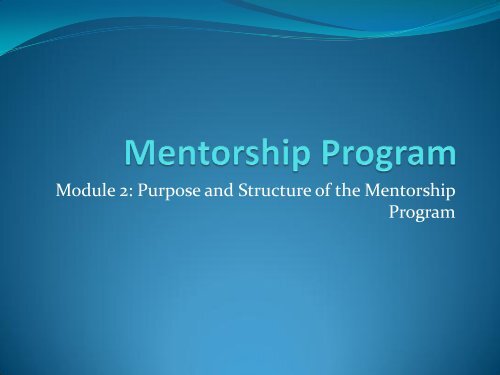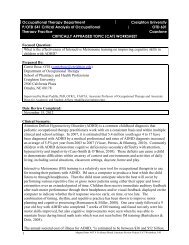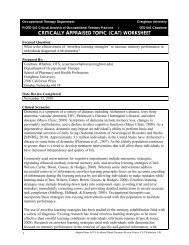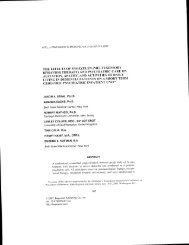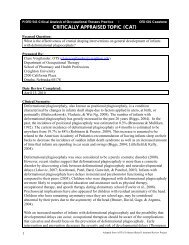Module 2: Purpose and Structure of the Mentorship - Creighton ...
Module 2: Purpose and Structure of the Mentorship - Creighton ...
Module 2: Purpose and Structure of the Mentorship - Creighton ...
Create successful ePaper yourself
Turn your PDF publications into a flip-book with our unique Google optimized e-Paper software.
<strong>Module</strong> 2: <strong>Purpose</strong> <strong>and</strong> <strong>Structure</strong> <strong>of</strong> <strong>the</strong> <strong>Mentorship</strong><br />
Program
Overview <strong>of</strong> <strong>Module</strong> 2<br />
� History <strong>of</strong> <strong>Mentorship</strong><br />
� What is <strong>Mentorship</strong>?<br />
� What is NOT <strong>Mentorship</strong>?<br />
� <strong>Creighton</strong> University <strong>Mentorship</strong> Program<br />
� <strong>Purpose</strong><br />
� Goals<br />
� <strong>Structure</strong><br />
� Who’s Who
Objectives <strong>of</strong> <strong>Module</strong> 2<br />
1. Describe <strong>the</strong> definition <strong>and</strong> proposed outcomes <strong>of</strong><br />
mentorship.<br />
2. Distinguish mentoring from supervising, precepting,<br />
teaching <strong>and</strong> networking.<br />
3. Articulate <strong>the</strong> purpose <strong>and</strong> structure <strong>of</strong> <strong>the</strong><br />
<strong>Creighton</strong> University <strong>Mentorship</strong> Program.
History <strong>of</strong> mentorship<br />
� Derived from Greek<br />
mythology<br />
� Odysseus , as he was<br />
leaving to fight in <strong>the</strong><br />
Trojan War, asked his<br />
friend Mentor to guide<br />
his son Telemachus into<br />
manhood<br />
� <strong>Mentorship</strong> has evolved,<br />
but maintained its<br />
general concept<br />
www.answers.com/topic/mentor
What is mentorship?<br />
� Special relationship between two people- one more<br />
experienced, one less experienced- that is both<br />
pr<strong>of</strong>essional <strong>and</strong> personal<br />
� Primary purpose is to help <strong>the</strong> less experienced person<br />
advance in his or her career development <strong>and</strong> meet his<br />
or her goals<br />
� Rich, personal rewards can be reaped if mentorship<br />
works well<br />
Ludwig & Stein, 2008
Aims <strong>of</strong> mentorship<br />
1. Facilitate <strong>the</strong> pr<strong>of</strong>essional development <strong>of</strong> mentee<br />
through guidance <strong>and</strong> counsel<br />
2. Establish a relationship characterized as an ongoing<br />
partnership based on trust, knowledge, <strong>and</strong> mutual<br />
respect<br />
3. Help mentees identify with <strong>the</strong> pr<strong>of</strong>essional<br />
environment, navigate difficult situations, <strong>and</strong> help<br />
build self-confidence <strong>and</strong> creative <strong>and</strong> independent<br />
thinking<br />
4. Help develop self-awareness <strong>and</strong> <strong>the</strong> ability <strong>of</strong><br />
mentees to express <strong>the</strong>ir thoughts or ideas<br />
Milner & Bossers, 2004
What does mentorship enhance?<br />
� Leadership<br />
development<br />
� Career development<br />
� Pr<strong>of</strong>essional<br />
development<br />
� Member recruitment<br />
<strong>and</strong> retention<br />
� Growth in <strong>the</strong>rapy<br />
practice, education,<br />
<strong>and</strong> research<br />
� Pr<strong>of</strong>essionalism<br />
Ridout, 2006<br />
www.autoimmune.com
Stop <strong>and</strong> reflect on <strong>the</strong> following…<br />
� Think about a time you’ve be involved in a mentorship.<br />
� What was your role- mentor or mentee?<br />
� Was <strong>the</strong> relationship successful? If so, what contributed<br />
to this?<br />
� If not, what could have been done to enhance <strong>the</strong><br />
experience?<br />
� What lessons did you learn that you can pass along to<br />
your mentee?
What is NOT mentorship?<br />
� Cloning: The mentor shouldn’t create a miniature<br />
version <strong>of</strong> himself or herself<br />
� Spoon-feeding: The mentee must take an active <strong>and</strong><br />
reflective role in <strong>the</strong> relationship<br />
� Supervision: Mentor is not merely responsible for<br />
monitoring <strong>and</strong> shaping mentee’s behavior so that<br />
organizational <strong>and</strong> pr<strong>of</strong>essional skills are met<br />
� Networking: <strong>Mentorship</strong> involves more than<br />
connecting with o<strong>the</strong>rs
<strong>Purpose</strong> <strong>of</strong> <strong>the</strong> <strong>Creighton</strong> University<br />
<strong>Mentorship</strong> Program<br />
� Alaska OT students will not have access to face to face<br />
interactions <strong>and</strong> socialization with OT faculty<br />
� Therefore, it is important that <strong>the</strong>y have <strong>the</strong><br />
opportunity to interact with “real OTs” in <strong>the</strong>ir local<br />
communities
Goal <strong>of</strong> <strong>the</strong> <strong>Mentorship</strong> Program<br />
� Mentors will be <strong>the</strong> “faces <strong>of</strong> OT” in <strong>the</strong> state <strong>of</strong> Alaska<br />
<strong>and</strong> will…<br />
� Assist students in setting <strong>and</strong> achieving pr<strong>of</strong>essional<br />
goals<br />
� Role model pr<strong>of</strong>essional behaviors<br />
� Welcome students into <strong>the</strong> pr<strong>of</strong>ession<br />
� Open doors for networking with <strong>the</strong> Alaska OT<br />
community<br />
� Provide support to students during <strong>the</strong>ir lengthy <strong>and</strong><br />
intense academic endeavor
Brainstorm <strong>and</strong> jot down some<br />
ideas you can use to fulfill <strong>the</strong> goals<br />
<strong>of</strong> <strong>the</strong> <strong>Mentorship</strong> Program.<br />
� What goals are appropriate for a new OT student?<br />
� What pr<strong>of</strong>essional behaviors are most important to<br />
you? Be sure to share this with your mentee!<br />
� What can you do to welcome your mentee into<br />
occupational <strong>the</strong>rapy? (invite <strong>the</strong>m to go with you to<br />
<strong>the</strong> AKOTA conferences/events, send <strong>the</strong>m an “OT<br />
care package”, invite <strong>the</strong>m to visit you at work <strong>and</strong><br />
introduce <strong>the</strong>m to your colleagues, etc.)
<strong>Structure</strong> <strong>of</strong> <strong>the</strong> <strong>Mentorship</strong> Program<br />
� Each student will be paired with mentor for a 1:1<br />
relationship, potentially for <strong>the</strong> length <strong>of</strong> <strong>the</strong> academic<br />
program (<strong>and</strong> beyond!)<br />
� These pairs will be assigned by <strong>the</strong> Academic Clinical<br />
Education Coordinator (Lou Jensen) based on potential<br />
compatibility<br />
� The mentoring relationship will largely be informal, with<br />
no set requirements for frequency <strong>of</strong> meetings or contacts<br />
� The Academic Clinical Education Coordinator will provide<br />
training to mentors <strong>and</strong> mentees <strong>and</strong> give suggested<br />
meeting frequencies <strong>and</strong> topics <strong>of</strong> discussion<br />
� The <strong>Mentorship</strong> Program is new, emerging, <strong>and</strong> will likely<br />
be polished <strong>and</strong> enhanced as it unfolds
Who’s who?<br />
� Mentor: Occupational Therapist in Alaska who<br />
volunteers <strong>the</strong>ir time <strong>and</strong> expertise<br />
� Mentee: Student in <strong>Creighton</strong> University Distance OT<br />
Program<br />
� <strong>Mentorship</strong> Program Coordinator: Lou Jensen,<br />
Assistant Pr<strong>of</strong>essor & Academic Clinical Education<br />
Coordinator at CU<br />
� loujensen@creighton.edu<br />
� (402) 280-5678
Who’s who? (cont.)<br />
� CU Distance OT Program Coordinator:<br />
Dr. Al Bracciano<br />
� alfredbracciano@creighton.edu<br />
� (402) 280-4906<br />
� CU-UAA Liaison: Dr. Susan Kaplan<br />
� afshk@uaa.alaska.edu<br />
� (907) 786-6057
References<br />
� Ludwig, S., & Stein, R. E. K. (2008). Anatomy <strong>of</strong><br />
mentoring. The Journal <strong>of</strong> Pediatrics, 152, 151-152.e1.<br />
� Milner, T., & Bossers, A. (2004). Evaluation <strong>of</strong> <strong>the</strong><br />
mentor-mentee relationship in an occupational<br />
<strong>the</strong>rapy mentorship programme. Occupational<br />
Therapy International, 11, 96-111.<br />
� Ridout, S. (2006). Mentoring: Guided by <strong>the</strong> light.<br />
Magazine <strong>of</strong> Physical Therapy, 14, 42-44.


